|
|
|
Sort Order |
|
|
|
Items / Page
|
|
|
|
|
|
|
| Srl | Item |
| 1 |
ID:
084294


|
|
|
|
|
| Publication |
2008.
|
| Summary/Abstract |
Recent research on strategic conflict avoidance and targeting in the American case shows that states avoid militarily challenging presidents whose domestic situations might be improved by diversionary conflict, and that congressional opposition to presidential foreign policy invites increased challenges by decreasing other states' perceptions of likely American resolve. This article seeks to refine these lines of research by considering the intervening effects of partisan ideology. As previous scholarship indicates that diversion is a more attractive option for conservative than for liberal governments, there are likely greater incentives for other states to strategically avoid Republicans given lagging economic conditions. Conversely, the relative liberal aversion to military ventures means that the resolve-undermining effects of congressional opposition are likely more pronounced for Democrats. Analyses of the American foreign policy experience from 1949 to 2001 provide support for these hypotheses, as increases in the misery index are related to substantial decreases in the militarized targeting of Republican administrations and congressional foreign policy opposition acts are related to substantial increases in the militarized targeting of Democratic administrations.
|
|
|
|
|
|
|
|
|
|
|
|
|
|
|
|
| 2 |
ID:
111746


|
|
|
|
|
| Publication |
2012.
|
| Summary/Abstract |
The possession of nuclear weapons confers many benefits on a state. The path to proliferation, however, is often violent. When a state initiates a nuclear weapons program, it signals its intent to fundamentally alter its bargaining environment. States that once had an advantage will now be disadvantaged. This change in the environment is not instantaneous, but evolves slowly over time. This gives states both opportunities and incentives to resolve underlying grievances, by force if necessary, before a nuclear weapons program is completed. Our cross-national analyses of nuclear weapons program and the onset of militarized conflict confirm this expectation. In particular, the closer a state gets to acquiring nuclear weapons, the greater the risk it will be attacked (especially over territorial issues). Once nuclear weapons are acquired, however, the risk of being attacked dramatically drops, though not below the risk of attack for non-proliferators.
|
|
|
|
|
|
|
|
|
|
|
|
|
|
|
|
| 3 |
ID:
154738
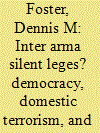

|
|
|
|
|
| Summary/Abstract |
This article develops expectations about the use of military force by democracies facing domestic terrorism. Due to the necessity of balancing effective counterterrorism with liberal acceptability, domestic terrorism typically represents a significant but nonexistential threat to democracies that is ineradicable via repression; as such, it is likely to generate appreciable diversionary incentives. Moreover, the use of force abroad, coupled with counterterrorist strategies that seek to safeguard democratic legitimacy, allows leaders to provide benefits both to citizens who seek retribution against terrorists and to those who value the preservation of liberty. Tests of the correlates of dispute initiation across all democracies, 1970–2000, provide support for this hypothesis. Further analyses reveal that diversion from domestic terrorism is most likely by democratic governments with relatively greater diversionary capacity and with lesser repressive capacity and incentive.
|
|
|
|
|
|
|
|
|
|
|
|
|
|
|
|
| 4 |
ID:
074829
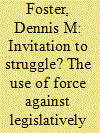

|
|
|
|
|
| Publication |
2006.
|
| Summary/Abstract |
Recently, international relations scholars have posited that, though economically unsuccessful American presidents may have incentives to divert via international conflict, their potential adversaries are also privy to their plight and may seek to avoid fighting them at such junctures. However, this "strategic conflict avoidance" (SCA) perspective offers relatively few insights concerning the impact of a potentially important source of leadership weakness in the American case: legislative opposition to presidential policy. Indeed, scholars seem uncertain about whether general legislative opposition actually drives American presidents to divert or leads them to refrain from international ventures. This article seeks to develop and test a general theory concerning the targeting of presidents who face legislative opposition to their foreign policies. The article predicts that economic distress increases "conflict avoidance" on the part of potential adversaries, whereas overt legislative opposition to presidential foreign policy decreases the utility of diversion and creates transparent elite divisions that invite targeting. Negative binomial generalized estimating equations (GEE) models of the U.S. foreign policy experience from 1949 to 2001 support these predictions, in that the U.S. is less likely to be the target of incident initiation by other states when the economic misery index increases, but is more likely to be targeted when members of Congress voice displeasure with presidential foreign policy. Further analyses show that these findings are generally strongest during periods of high American inflation, in the context of enduring rivalries, and during the Cold War.
|
|
|
|
|
|
|
|
|
|
|
|
|
|
|
|
| 5 |
ID:
133584
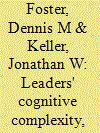

|
|
|
|
|
| Publication |
2014.
|
| Summary/Abstract |
Some scholars have suggested that when faced with domestic political problems, leaders employ simplified decision processes, preferring action to deliberation and highly visible diversionary uses of force to alternative policies. Others contend that domestically embattled leaders will pursue a more rational examination of the costs and benefits of various options-the sort of deliberation that will lead them to reject diversionary force in favor of less risky measures. Drawing on research in political psychology, we argue that leaders' cognitive processes are not constants but variables, and that both models are correct under certain circumstances. Leaders low in conceptual complexity (CC), and especially those with hawkish leanings, will pursue simplified decision-making procedures and embrace diversionary strategies, while leaders who are high in complexity will pursue a more thorough consideration of risks and alternatives and generally avoid diversionary actions. We examine these expectations by testing the interactive effect of economic misery and leaders' CC on American force usage for the period 1953-2000. The findings indicate that more conceptually simple leaders-particularly when high in distrust, a trait linked to more hawkish policy inclinations-are significantly more likely to engage in diversion.
|
|
|
|
|
|
|
|
|
|
|
|
|
|
|
|
| 6 |
ID:
133583
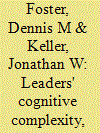

|
|
|
|
|
| Summary/Abstract |
Some scholars have suggested that when faced with domestic political problems, leaders employ simplified decision processes, preferring action to deliberation and highly visible diversionary uses of force to alternative policies. Others contend that domestically embattled leaders will pursue a more rational examination of the costs and benefits of various options-the sort of deliberation that will lead them to reject diversionary force in favor of less risky measures. Drawing on research in political psychology, we argue that leaders' cognitive processes are not constants but variables, and that both models are correct under certain circumstances. Leaders low in conceptual complexity (CC), and especially those with hawkish leanings, will pursue simplified decision-making procedures and embrace diversionary strategies, while leaders who are high in complexity will pursue a more thorough consideration of risks and alternatives and generally avoid diversionary actions. We examine these expectations by testing the interactive effect of economic misery and leaders' CC on American force usage for the period 1953-2000. The findings indicate that more conceptually simple leaders-particularly when high in distrust, a trait linked to more hawkish policy inclinations-are significantly more likely to engage in diversion.
|
|
|
|
|
|
|
|
|
|
|
|
|
|
|
|
| 7 |
ID:
072143
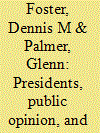

|
|
|
|
|
| Publication |
2006.
|
| Summary/Abstract |
Numerous works have studied the relationship between public approval and the propensity of United States presidents to use force abroad. One of these (Morgan and Bickers 1992 ) relies upon a refined view of internalization-externalization processes to reformulate the diversionary theory of conflict. The authors postulate that, as presidents are concerned with maintaining popularity among individuals upon whose support their continued power rests, they are more inclined to use diversionary force when approval among members of their party declines. Using more extensive and comprehensive measures of militarized actions, we find no support for Morgan and Bickers' original hypothesis, indicating that the results of one of the very few works that finds any evidence of diversion from low public approval may not be valid. In fact, event count analyses reveal that precisely the opposite relationship is operative. Additionally, Morgan and Bickers' formulation fails to account for potential differences in conflict propensity stemming from differences in political parties. We hypothesize that presidents whose partisan supporters are expected to react favorably to "hawkish" actions (Republicans) are more likely to use force abroad when faced with declining partisan support than those leaders whose partisan supporters are generally "dovish" (Democrats). Our results yield little support for this hypothesis. We conclude the article by exploring some possible explanations for our findings.
|
|
|
|
|
|
|
|
|
|
|
|
|
|
|
|
|
|
|
|
|